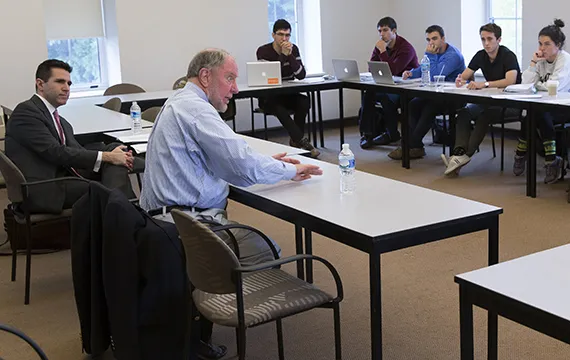Noted Author Robert Putnam '63 Sees the American Dream in Crisis

Robert Putnam '63 spoke with students in Associate Professor of Political Science Ben Berger's class last fall before delivering a campus talk, "Our Kids: The American Dream in Crisis."
The Washington Post: The terrible loneliness of growing up poor in Robert Putnam's America
Robert Putnam ['63] wants a show of hands of everyone in the room with a parent who graduated from college. In a packed Swarthmore College auditorium where the students have spilled onto the floor next to their backpacks, about 200 arms rise.
"Whenever I say 'rich kids,' think you," Putnam says. "And me. And my offspring."
The Harvard political scientist, famous for his book Bowling Alone that warned of the decline of American community, has returned to his alma mater to talk, this time, about inequality. Not between the 99 percent and the 1 percent, but between two groups that have also fallen further apart: children born to educated parents who are more likely to read to them as babies, to drive them to dance class, to nudge them into college themselves — and children whose parents live at the edge of economic survival.
The distance between the two is deeply personal for Putnam, now 74 and launching a book that he hopes could change what Americans are willing to do about children in poverty. He grew up in a working-class Ohio town on Lake Erie where, in the 1950s, poor kids could aspire to Rotary scholarships or factory jobs. He left Port Clinton for Swarthmore, where he met a woman in his introductory political science class who would raise two children with him. They would go on to Harvard. His grandchildren are college-bound, too, or already there, one of them living on the same floor of the dorm where Putnam once bunked.
Some of his classmates from Port Clinton in the 1950s, meanwhile, stayed for manufacturing jobs that later disappeared. Their children faced rising unemployment and stagnating wages. A third generation was born poor, often without two parents.
...
For the past three years, Putnam has been nursing an outlandish ambition. He wants inequality of opportunity for kids to be the central issue in the 2016 presidential election. Not how big government should be or what the “fair share” is for the wealthy, but what’s happening to children boxed out of the American dream.
His manifesto, “Our Kids: The American Dream in Crisis” will be published Tuesday. It places brain science, sociology and census data alongside stories of children growing up on both sides of the divide. Many of the findings draw on the work of other researchers who have long studied families, education or neuroscience. But Putnam has gathered up these strands under a single thesis: that instead of talking about inequality of wealth or income among adults, we ought to focus on inequalities in all of the ways children accumulate — or never touch — opportunity.
The gaps he identifies have been widening on both ends: Better-off families are spending ever-more money on their children. They’re volunteering even more at their schools. Their children are pulling away as Mary Sue falls further behind, and her original mistake was simply, as Putnam puts it, that she chose her parents badly. ...
Read the full article at The Washington Post.
Robert Putnam '63, the Peter and Isabel Malkin Professor of Public Policy at Harvard University, graduated from Swarthmore College with a major in political science and earned his masters and doctorate from Yale University. In 1990, he was awarded an honorary doctor of laws degree from Swarthmore. In 2006, Putnam received the Skytte Prize, the world's highest accolade for a political scientist and, in 2012, he received the National Humanities Medal, the nation’s highest honor for contributions to the humanities.
"Swarthmore was the most important thing that ever happened to me, period," Putnam told the Bulletin last year. "Swarthmore is where I met my wife, where I became intellectually open and alive, and where I became involved politically and socially. That intense interest in public service and public affairs is an extremely powerful part of the Swarthmore culture, and I drank that in."



